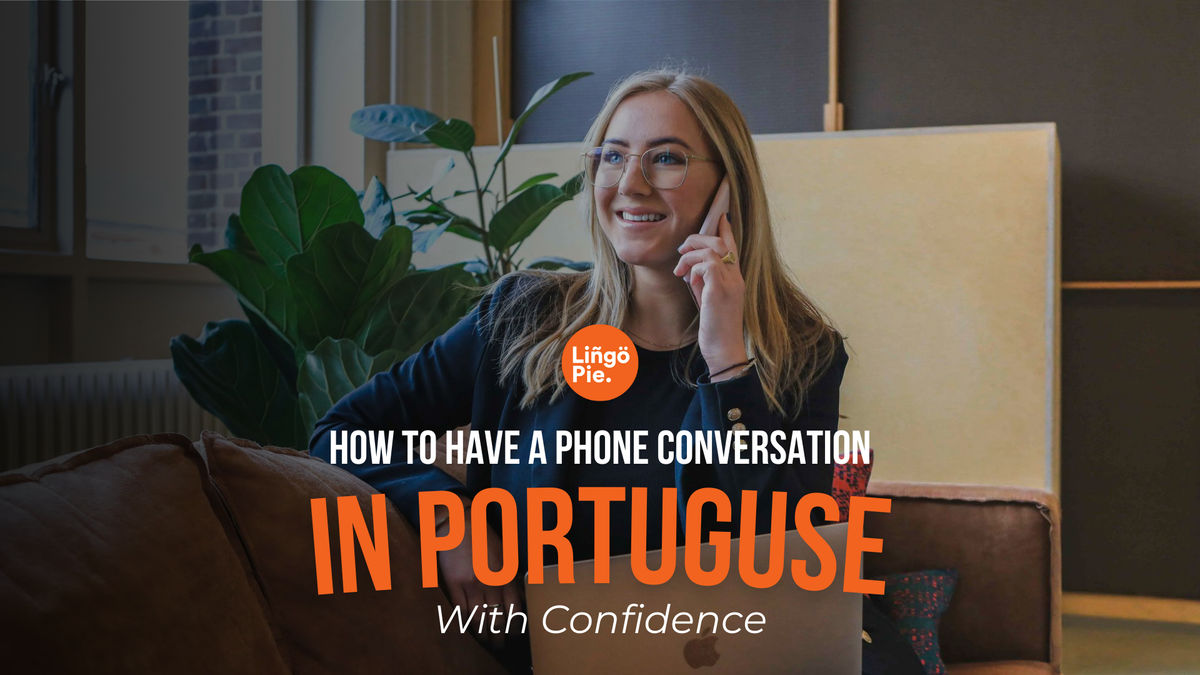There you are! You've been studying Portuguese for a while, and little by little, you've been building your vocabulary. You can even hold a conversation—as long as it's in person. For some reason, you find the idea of having a phone conversation in Portuguese quite intimidating. No need to worry—we've got your back. In this blog post, we'll show you how to have a phone conversation in Portuguese with confidence. Sem mais delongas, vamos começar!

Understanding Basic Phone Etiquette In Portuguese
Being able to have a phone conversation in Portuguese can really boost your communication skills and help you connect more effectively with Portuguese speakers. However, before picking up the phone, there are some aspects that you need to keep in mind, and one of them is phone etiquette. Understanding the differences between formal and informal speech is key to communicating appropriately with different people.
- Formal speech: Use it in professional settings or when talking to someone you don't know well. Remember, politeness is crucial.
- Informal speech: Used with friends, family, and people you know well. This type of speech is more relaxed and casual.
Let's take a look at the following example:
Formal Context:
-Pessoa que está a ligar: "Bom dia, aqui é Sebastian da empresa ALX. Posso falar com a Sra. Silva?"
- Caller: "Good morning. This is Sebastian from ALX. May I speak with Mrs. Silva?"
Casual Context:
-Pessoa que está a ligar: "E aí, beleza? É o Sebastian, da firma ALX. A Silva está?"
-Caller: "Hey, what's up? It's Sebastian from ALX. Is Silva there?"
As you can see, the expressions we use can be significantly different depending on the context. It's important to remember this to avoid being rude to the person we are talking to.
Key Phrases For Starting A Phone Conversation
After defining who we are going to speak to, it is time to pick up the phone. Understanding the key phrases to start a phone conversation in Portuguese is essential for effective communication. Whether it's a business call or catching up with a friend, knowing how to start the conversation politely sets the tone for a good conversation. Here, we will explore the essential greetings, introductions, and polite questions to help you confidently start any Portuguese phone conversation.
Common Greetings
-Bom dia (Good morning)
-Boa tarde (Good afternoon)
-Boa noite (Good evening)
-Alô (Hello)

Introducing Yourself
Introducing yourself properly during a phone conversation makes all the difference when it comes to making a good first impression. Depending on the situation, you may not only have to say your name but also have to provide some context about yourself or the reason for your call. Here are some practical examples and phrases to help you introduce yourself in various situations:
Basic Self-Introduction
-Meu nome é [Seu Nome]. (My name is [Your Name].)
-Eu sou [Seu Nome] (I am [Your Name])
Introducing Yourself in a Professional Context
-Eu sou [Seu Nome], da [Nome da Empresa]. (I am [Your Name], from [Company Name].)
Example: Eu sou Lucia, da Tech Solutions. (I am Lucia from Tech Solutions.)
-Eu trabalho no departamento de [Departamento]. (I work in the [Department] department.)
Example: Eu trabalho no departamento de marketing. (I work in the marketing department.)
Explaining The Purpose Of Your Call
As we mentioned before, in some instances, you may have to explain the reason/purpose of your call, and you also ask if the person you are calling is available. For such scenarios, you can use the following phrases.
-Eu estou ligando para falar sobre [Assunto]. (I am calling to talk about [Subject].)
Example: "Eu estou ligando para falar sobre a reunião de amanhã." (I am calling to talk about tomorrow's meeting.)
-Eu gostaria de discutir [Assunto]. (I would like to discuss [Subject].)
Example: "Eu gostaria de discutir o novo projeto." (I would like to discuss the new project.)
Phrases to Ask About Availability
-A Sra. Salma está disponível? (Is Ms. Salma available?)
-Você pode falar agora? (Can you talk now?)
How To Handle The Main Part Of The Conversation?
Once you've successfully started your phone call in Portuguese, try to navigate the main part of the conversation with clarity and confidence. This section will guide you through essential phrases and strategies for asking for information, clarifying details, and making requests.
Asking For Information
When requesting information, the following phrases can be very useful:
-Você poderia me informar sobre...? (Could you inform me about...?)
Example:"Você poderia me informar sobre os horários dos trens para Lisboa?"(Could you inform me about the train schedules to Lisbon?)
-Pode me dizer...? (Can you tell me...?)
Example: "Pode me dizer a que horas o ginásio está aberto? ("Can you tell me what time the gym is open?)
Clarifying Information
In case you do not understand what the person on the other end of the phone told you, it is always wise to ask them to repeat or clarify what they said.
-Você poderia repetir, por favor? (Could you repeat, please?)
-Não entendi, pode falar de novo? (I didn't understand; can you say it again?)
Making Requests
In order to have successful telephone conversations in Portuguese, you must be able to make requests politely and clearly. Using the right phrases ensures that your requests are understood and met effectively, whether you're seeking information, assistance, or specific services. This section will provide helpful expressions and tips to help you articulate your needs confidently and courteously.
-Eu preciso de... (I need...)
Example: Eu preciso de algumas informações sobre o horário de funcionamento. (I need some information about the opening hours.)
-Você pode me ajudar com...? (Can you help me with...?)
Example: Você pode me ajudar com a reserva de um quarto? (Can you help me with booking a room?)
Example: Você poderia enviar os documentos por e-mail, por favor? (Could you send the documents by email, please?)
Ending The Conversation Politely
When the conversation is over, thank the other person for their time and make a small parting comment to end the conversation. At that point, you can say:
-Obrigado(a) pela ajuda. (Thank you for the help)
-Foi um prazer falar com você. (It was a pleasure talking to you)
-Adeus or Tchau. (Goodbye)
Tips For Effective Phone Communication In Portuguese
- Speak clearly and slowly to ensure the other person understands what you're saying.
-Use appropriate language. Always aim for politeness, especially in formal settings.
- Avoid slang or overly casual language unless you know the person you're speaking to.
-Don't interrupt the other person. Let them finish speaking before you respond.
*Be aware of regional differences in language use: Portuguese varies between countries (e.g., Portugal vs. Brazil) and even within regions of the same country.
Phone Related Vocabulary Related In Portuguese
Frequently Asked Questions About Having A Phone Conversation In Portuguese
1. How Do You Start A Conversation In Portuguese?
Just like any other language, a conversation in Portuguese usually starts with a polite greeting and a simple introduction.
2. Do I Say Obrigado Or Obrigada?
Both words mean "thank you," and their use depends on your gender:
-Obrigado is used if you are male.
-Obrigada is used if you are female.
3. How Long Does It Take To Learn Conversational Portuguese?
There is no exact answer to this question. The time it takes to learn conversational Portuguese may vary depending on several factors, such as your native language or linguistic background, the time you spend practicing, and the methods you use. For example, it may be easier for a native Spanish speaker to learn Portuguese faster than a Japanese speaker because of the similarities between Spanish and Portuguese.
Learn Portuguese With Lingopie!
Including media in your Portuguese learning routine can make a huge difference. TV shows, movies, and other forms of entertainment allow you to immerse yourself in the language as it's spoken by native speakers, exposing you to authentic dialogues, cultural nuances, and idiomatic expressions. Without a doubt, this approach makes learning more enjoyable and helps improve listening skills, pronunciation, and comprehension in a context that textbooks alone cannot provide.
Ready to take your Portuguese to the next level? Start practicing today and unlock a new level of fluency in Portuguese.








![How To Learn Portuguese Fast? [Best 2025 Guide]](/blog/content/images/size/w300/2024/08/Lingopie-2.png)
